« July 2006 | HOME PAGE | September 2006 »
August 25, 2006
Xinjiang Summertime
 Since my days are almost completely free of commitment, I've been spending lots of time recently swimming in the Kongque River (孔雀河). There's a spot about 10 minutes from my house called Sun Island (太阳岛) that is absolutely perfect: the water is cool and refreshing, the view of the Tian Shan mountains is stunning, the area is surrounded by picturesque Uyghur farms, and the noise of the city fades away to nothing. It's one of the great pleasures of living in Korla that suburbs are non-existent... outside of the city center, nature still reigns supreme and the livin' is easy.
Since my days are almost completely free of commitment, I've been spending lots of time recently swimming in the Kongque River (孔雀河). There's a spot about 10 minutes from my house called Sun Island (太阳岛) that is absolutely perfect: the water is cool and refreshing, the view of the Tian Shan mountains is stunning, the area is surrounded by picturesque Uyghur farms, and the noise of the city fades away to nothing. It's one of the great pleasures of living in Korla that suburbs are non-existent... outside of the city center, nature still reigns supreme and the livin' is easy.
Below is a short photo essay I've put together from pictures I snapped yesterday. Since I can go swimming anytime I please, my fellow beach-goers are more often children than adults. When I took out my camera to take some shots, these young Uyghur boys were more than happy to ham it up. Behold, the pleasures of summer life in Korla:
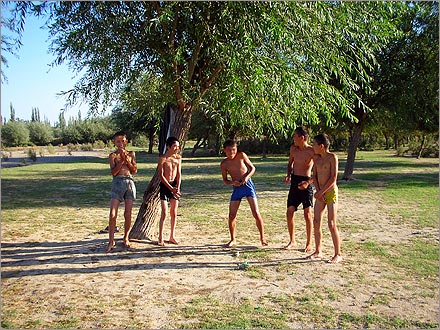
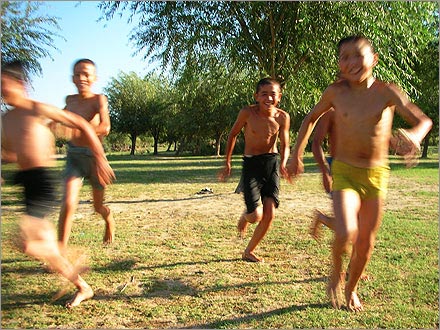
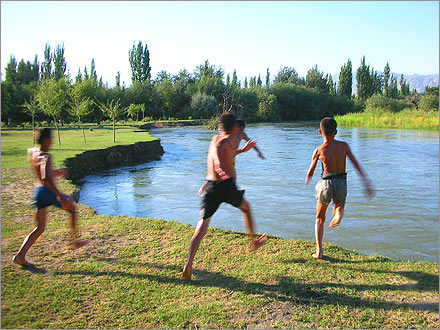
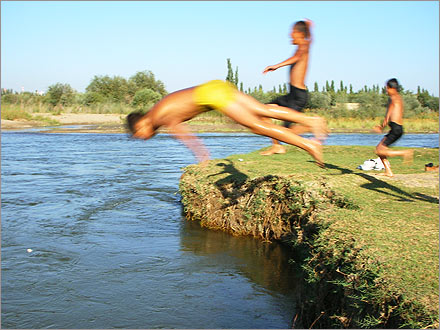

posted August 25, 2006 at 11:44 AM unofficial Xinjiang time | Comments (28)
August 24, 2006
Best China Blog?
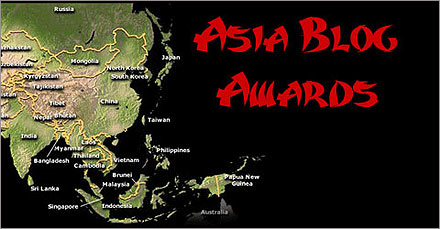
Check it out... I'm a nominee for "Best China Blog" in the 2006/2007 Asia Blog Awards, being run this year by Asia Pundit. The voting hasn't begun yet, but I expect all of you to vote for The Opposite End of China when the polls open.
Seriously though, it's an honor just to be competing. Much thanks to whoever nominated me!
posted August 24, 2006 at 03:46 PM unofficial Xinjiang time | Comments (16)
August 17, 2006
XXX Uyghur Sex Video!
Alright, I'm just kidding, but I thought the title might generate some traffic. Visitors to this site have been declining recently for reasons that aren't entirely clear. Where has everybody gone?
I'm posting another Uyghur music video below, this time by Mardan Muhammat Tatlik AKA Mawlan Tatlik. It's a pretty good pop song... damn good by fairly low Xinjiang standards. I happened to hear it as I walked past my local Uyghur VCD shop last weekend and it immediately caught my ear. It doesn't hurt that the video features a beautiful Uyghur woman in the typical "anonymous dancer" role. Enjoy! (Any Uyghurs out there who would like to venture a translation would be greatly appreciated. At least try to let me know what the chorus means.)
posted August 17, 2006 at 09:38 AM unofficial Xinjiang time | Comments (55)
August 12, 2006
Tian Shan Tomatoes
Just thought that some of you might be interested in getting a peak at our sundried tomato operation here in Xinjiang:

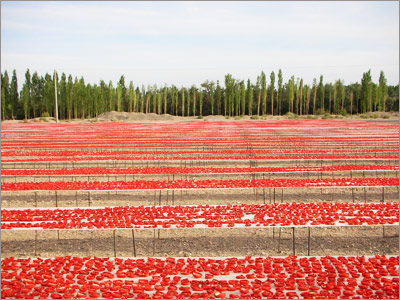
posted August 12, 2006 at 07:21 PM unofficial Xinjiang time | Comments (21)
August 11, 2006
Korla-Golmud Railway

Via SinoCast, excellent news for travelers in western China:
China is planning to build two new railways from Golmud, Qinghai province respectively to Korla, Xinjiang Autonomous Region and Dunhuang, Gansu Province, making Golmud the transportation center in the whole northwest region.
Of course, the line isn't expected to open for five to ten years, but it's exciting news nonetheless. Most important is the fact that this new rail line will open up transportation between northwest and southwest China, eliminating the need to travel through an out-of-the-way hub like Lanzhou or Xi'an. When the project is completed, travelers in Xinjiang will be able to travel by rail to Tibet, and will also be able to explore previously difficult-to-reach areas like western Qinghai.
As a byproduct, I expect to one day actually see a few tourists here in Korla, waiting for the train to Golmud and Lhasa. It gets lonely here, what with only a dozen or so confirmed foreigners... and I only have contact with about half that number!
You can read the full article below.
China to Build Golmud-Korla, Golmud-Dunhuang Raiways
9 August 2006
SinoCast China Business Daily News
(c) 2006 SinoCast LLC. All Rights Reserved.
QINGHAI, August 09, SinoCast -- China is planning to build two new railways from Golmud, Qinghai province respectively to Korla, Xinjiang Autonomous Region and Dunhuang, Gansu Province, making Golmud the transportation center in the whole northwest region.
The feasibility study report on the would-be railway from Golmud to Korla has been completed, expected to start in the eleventh or twelfth Five-Year Plan period. The railroad will be a second convenient passage connecting Xinjiang with China inland and a part of China's second Eurasia Bridge.
It has permitted the construction plan on the railway from Golmud to Dunhang, expected to start working in the eleventh Five-Year Plan period.
Golmud is located in the hinterland of the Qinghai-Tibet Plateau, with its urban area in the center south of Qaidam Basin. It is the cross by Qinghai-Tibet highway and raiway, Qinghai-Golmud and Qinghai-Xinjiang highways.
posted August 11, 2006 at 09:31 AM unofficial Xinjiang time | Comments (19)
August 07, 2006
Arise! 起来!
Arise, ye who refuse to be slaves!
起来! 不愿做奴隶的人们!
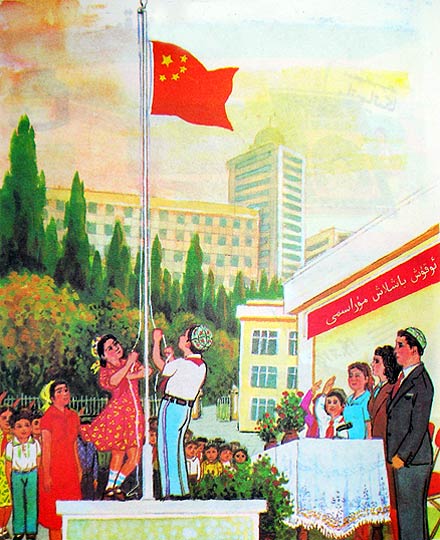
This, ummm... interesting picture from the front of my Uyghur alphabet textbook got me thinking about national anthems. The United States' Star-Spangled Banner is often criticized as ultra-violent, what with rockets red glare, bombs bursting in air, and so on. I decided to look up an English translation of the Chinese national anthem, March of the Volunteers (义勇军进行曲):
Arise, ye who refuse to be slaves;
With our very flesh and blood
Let us build our new Great Wall!
The peoples of China are at their most critical time,
Everybody must roar defiance.
Arise! Arise! Arise!
Millions of hearts with one mind,
Brave the enemy's gunfire,
March on!
Brave the enemy's gunfire,
March on! March on! March on, on!
Now I feel a deeper bond with the Chinese. Bombs bursting in air has got nothing on brave the enemy's gunfire. I think we're going to have to rewrite the American national anthem to make sure everyone knows who's society is the most violent on Earth!
posted August 07, 2006 at 01:44 PM unofficial Xinjiang time | Comments (28)
August 02, 2006
Moblogging Xinjiang
 As you can see above, I've added a new feature to this site. My mobile phone went swimming with me in the Kongque River (孔雀河) a few days ago, so I had to go out and buy a new one: the super-slim Motorola L6 (pictured) to be exact. The coolest thing about the new phone is that it can use China Mobile's GPRS network to surf the web, check email, download games, etc. This also lets me send cameraphone photos to my flickr account via email... meaning I can now instantly post photos to this blog from anywhere and everywhere. Cool, huh? The quality of the photos is nothing like what I get from my digital camera, but it will be fun knowing that if I see something interesting, I can share it with all of you in seconds. The banner above shows my most recent five photos, with the latest photo on the far left... click for a larger image and info.
As you can see above, I've added a new feature to this site. My mobile phone went swimming with me in the Kongque River (孔雀河) a few days ago, so I had to go out and buy a new one: the super-slim Motorola L6 (pictured) to be exact. The coolest thing about the new phone is that it can use China Mobile's GPRS network to surf the web, check email, download games, etc. This also lets me send cameraphone photos to my flickr account via email... meaning I can now instantly post photos to this blog from anywhere and everywhere. Cool, huh? The quality of the photos is nothing like what I get from my digital camera, but it will be fun knowing that if I see something interesting, I can share it with all of you in seconds. The banner above shows my most recent five photos, with the latest photo on the far left... click for a larger image and info.
I know, I know... moblogging (mobile blogging) is so 2003, blah, blah, blah. But I don't think it's ever really caught on in China. The only other moblogger I could find in China (at least in the English-speaking blogosphere) is the Beijing-based Dreams of White Tiles. So, I may not be the only moblogger in China, but I can at least hope that I'm the only foreigner moblogging in Xinjiang - or in all of western China for that matter, right?
posted August 02, 2006 at 10:41 PM unofficial Xinjiang time | Comments (24)
NY Times in Urumqi
I love it when the New York Times comes to Xinjiang. Last year they came to Korla. This time, the paper's Frugal Traveler - who's been trekking across the face of the Earth this summer to entertain us with tales of cheap hotels and local encounters - spent a day in Urumqi waiting for the train to Beijing. Best of all, he stopped at Fubar, Xinjiang's best expat watering hole (and pizzeria).
You can read the whole article below.
On a People’s Train from Urumqi to Beijing
August 2, 2006
Frugal Traveler
By MATT GROSS
It was a slow day in the railway ticket office in downtown Urumqi, and as I walked up to the counter, where there was no line, I was feeling lucky. Then the ticket clerk pronounced the two syllables that every traveler in China dreads: “Mei you.” The literal translation is “don’t have,” but the phrase can imply anything from “That simply does not exist” to “I’m afraid of foreigners; maybe one of my braver colleagues will step forward to help you.”
In my case, the ticket clerk meant it literally: Tickets for tomorrow’s T70 train to Beijing from Urumqi, the capital of China’s far western Xinjiang province, were sold out. No seats, no sleepers — nothing was available for four days. My only option for tomorrow, she explained (with the help of my taxi driver, whose elementary English complemented my elementary Chinese), was to buy a hard seat on the 52-hour ride ... to Shanghai.
I hung my head and covered my face with my hands. What had I gotten myself into? I had flown in from Bishkek, Kyrgyzstan, only an hour before, on a $199 fixed-fare China Southern Airways flight, and did not particularly want to stick around Urumqi. After two and a half months of racing across the globe, the end was dangerously close. If I got stuck in Urumqi, I might miss Beijing, Shanghai or even my flight to San Francisco. I could have flown to Beijing for an extra $75, but I longed for the 48-hour train ride there, on which I hoped to get a people’s-eye view of life in the People’s Republic.
As I fretted, however, help arrived in the form of Huo, a blue-uniformed security guard who overheard my plight and, apparently out of sympathy, offered to sell me his own ticket — a hard sleeper, the second highest and most popular class — for face value: 631 yuan (about $80 at 7.9 yuan to the dollar). Worried it might be a scam, I flipped through my indispensable Langenscheidt dictionary and asked the clerk if the peach-colored ticket was “legitimate.” It was, she said. The next day at 2:19 p.m., I would begin my journey to the capital.
But first, Urumqi. After checking into the grand but soulless Kunlun Hotel (51 North Youhao Road, 86-991-440-411; 320 yuan), I made for the spanking-new Museum of Xinjiang Uighur Autonomous Region (25 yuan), which details the province’s role in the Silk Road trading system and its gradual rise as an “Inalienable Component of the Great Motherland.” The museum struck me more as a propaganda machine designed to gloss over the repression of the local Muslim Uighur populace by the ethnic Han Chinese.
From there I wandered modern Urumqi, a sprawling grid of skyscrapers and highways that China wants to make its gateway to Central Asia and the Middle East. Cranes loom over building sites, the streets are abuzz with traffic and people, Arabic script crowns street signs, and both the Sheraton and Kempinski hotel chains are opening in the near future.
Though readers dismissed Urumqi as just another big Chinese burg, I found it stimulating after sleepy Bishkek. As night fell, crowds bustled around the food stalls outside the shopping malls on Youhao Road, gnawing goat kebabs (1 yuan apiece) and picking through platters of crayfish in a place that is farther from the ocean than just about any other city on earth.
At another market in the Uighur part of town, the mood was more somber but the food just as exciting. I tucked into deliciously gamy roast lamb (60 yuan per kilo) served with naan bread, then watched a weird scene involving a stolen computer, a repentant thief and a drunken cop — which ended with my running for the highway and grabbing the first taxi I saw (base fare: 6 yuan). I needed a drink myself, so I went to Fubar (1 Gongyuan North Road, 86-991-584-4498), a dim, friendly saloon run by Western expatriates, where I met a European businessman working on the Sheraton project. Why build a Sheraton in Urumqi?
“Honest to God,” he said, “I have no idea.”
Neither did I. While fun for one night of random encounters, Urumqi had little else to offer. The next day, I boarded the T70 just before noon (trains throughout the country run on Beijing time) and located my bed, the middle bunk in a set of three facing another set of three in a car with 20 such sets, all open to the corridor. Crowded? A little, but also spotless, modern, cozy and friendly. As the train rolled eastward, I met my neighbors: a husband and wife in their 50’s returning from a visit to his brother; a woman who ran a plastic-bag factory in Urumqi; a hip-hop-loving teen about to start his freshman year at a university in Beijing.
Slowly, families began to set up temporary households. Thermoses of tea were filled with freely available hot water, children swung from the bunks and recited multiplication tables, and the rods that ran the length of each wide window were draped with damp towels in a pastel rainbow of blues and pinks. As much as I could, I tried to adapt to their rhythms, slurping spicy instant ramen instead of buying 15-yuan meals of rice and vegetables, and preparing for bed at the unconscionably early hour of 10 p.m. But soon after the lights went out, I was swaddled in fresh white sheets and the smooth train rocked me gently to sleep.
Early the next day, as passengers padded about in rubber sandals and sipped their morning cups of tea, my bunk slowly became a zoo. People would seek me out: the children to stare at this rare blue-eyed traveler in their midst; the adults to practice English and meet a real life American. With an Urumqi high-school teacher, I griped about the problems that both China and the United States share, like housing, health care and politicians. With An-ran, a gap-toothed 8-year-old comedian, I sang Chinese nursery rhymes. And when people asked why I was in China, I invented a story about how I’d saved money, quit my job and was circling the globe alone — thus reinforcing the stereotype of Americans as rich and indolent. (My countrymen, I apologize.)
By afternoon, everyone was comfortable enough with my presence that I could barely wander the corridors without being asked to join a game of cards, or sit on a bunk and listen to a Uighur man strum energetic folk songs on his two-string guitar. The 48 hours went by quickly. There was always something happening, whether it was the Dushanbe shoe salesman who came by to chat, a toddler to exchange funny faces with, or the 20-minute station stops, when half the train seemed to rush outside to buy some strange local melon.
During the rare quiet moments, I would glance up from my reading — Gogol’s “Dead Souls” — and gaze out the window at the ever-changing landscape. What began near Urumqi as a wide desert landscape — its desolate beauty a master class in yellows and browns — turned into a more traditional Chinese panorama: terraced hills furrowed with squiggly paths, gently fading into mist-shrouded mountains. Finally, as we neared Beijing, the fields of corn and wheat were increasingly interrupted by factories and office parks, and the fog that had lent the mountains their mystical aura became instead a smoggy haze that blotted the sun and trapped the heat. Luckily, the train cars were well air-conditioned.
Still, after two nights in such close quarters, we were all a little tired and smelly. (A few women somehow managed to maintain fresh looks.) As the train inched toward the capital, new friends exchanged business cards and phone numbers, while a half-dozen people stopped by to remind me to consolidate my belongings.
After stuffing my toothbrush and uneaten packets of ramen in my bag, I sat by the window to get in a few final pages of “Dead Souls,” and came across these apt words spoken by Gogol’s itinerant hero: “To have a look at the world, at people’s daily round — no matter what anyone says, it’s like a living book, a second education.” So just before noon, I arrived at Beijing West Station, an unshowered but happy graduate of the T70 University of Chinese Studies.
Next stops: Beijing and Shanghai.
posted August 02, 2006 at 07:15 PM unofficial Xinjiang time | Comments (18)
August 01, 2006
First July, Second July?
So, I've heard plenty here in China about how this year is the best year to get married, have a baby, etc. The reason? Well, it has something to do with the assertion that this year contains "two Springs". This year also features two Chinese Valentine's Days (Qixi Qingren Jie/七夕情人节)...one was yesterday, July 31st, and the second will be in a month on August 30th. On the Chinese calendar, both days are listed as the seventh day of the seventh month (aka July 7th).
How can there be two July's in a row? How can there be two Springs in a single year...and how can next year have no Spring? I can't figure it out, even after reading a New York Times article from earlier this year that touches on the subject. You can read the article for yourself below.
This is a plea for help. I'm hoping someone better versed in Chinese culture and astrology who reads this will be able to answer me: why are there two July's this year?
Entering the Year of the Wedding
The New York Times
January 29, 2006
By JENNIFER TUNG
Correction Appended
WOMEN wishing to marry might try to hurry the process along, slyly dropping hints about rings or blatantly pressuring boyfriends to pop the question. But not Jennifer Chung.
Ms. Chung, who is Chinese-American, held off her wedding plans until just the right moment so she could get married in the Year of the Dog, which begins today, the first day of Chinese New Year.
Her reasoning was based on luck, not logistics. Ms. Chung, 29, an account supervisor at Gigante Vaz Partners, an advertising agency in New York, considers the Year of the Dog to be an auspicious one for weddings. Last year, the Year of the Rooster, was thought to be particularly unlucky for marriages.
The reason many Chinese (and half-Chinese) couples are choosing Dog wedding dates over Rooster ones traces back to the solar calendar. The Year of the Rooster, which began on Feb. 9, 2005, and ended yesterday, did not contain a lichun, or beginning of spring. (Lichun usually falls on Feb. 4, the halfway point between the winter and summer solstices.) A year without a lichun is called a "widow year" or "blind year," explained Theodora Lau, the author of "The Handbook of Chinese Horoscopes" (HarperCollins, 2005). "The thinking is that if you get married in a blind year, you didn't look at what you were doing, and you could get divorced next year."
Many couples, both tradition-minded and modern, took notice, postponing wedding plans last year. (According to articles in the Asian press, would-be brides and bridegrooms in China shunned the Rooster in large numbers, often leaving wedding-related businesses there with empty reception halls.)
The Year of the Dog, which will end Feb. 17, 2007, will span two lichun, Ms. Lau said. "It's very lucky to see spring in the beginning of the year and in the end. A lot of people would love to get married in a double-spring year."
In late 2004 Ms. Chung's mother first mentioned the significance of the calendar to her daughter. "It stuck in my mind," Ms. Chung recalled. She then relayed the concern to her boyfriend, Jay Wilkins, who had already asked Ms. Chung's parents for her hand in marriage. Fortunately he was on board for a Year of the Dog wedding. They'll walk the aisle in March.
Ms. Lau said this phenomenon, which occurs every five years, has long drawn couples to the altar. "Ancient matchmakers would tell parents who were paying for the weddings, 'This is a lucky, prosperous year.' " she said. "It was a way to draw in business."
It still is. Albert Chu, manager of the Golden Bridge Restaurant in Chinatown in New York, says "the two springtimes" ought to create a surge in wedding banquets. "We've had a lot of calls asking to reserve the party room," he said.
Johnson Lau, owner of Highlight Studio Wedding Center, a Chinatown wedding planner, said his business has recovered from the 20 percent dip in bookings he experienced last year. "We've already booked 50 for this coming year," he said.
For other Chinese-American fiancées, marrying in the Year of the Dog is not as clear a choice as it might seem. Peggy Pei-Yi Hwan, 32, a research analyst at Standard & Poor's in New York, is also planning a Year of the Dog wedding. Upon reflection, a Rooster date would have been cause for some concern. "My family is superstitious, and I've inherited that to an extent," she said. "Part of me is relieved that I'm not getting married in a year that is considered bad luck."
She and her fiancé, Geordie Hebard, settled on a March wedding, but once a date was determined, the couple was unexpectedly whipsawed by another cultural and religious issue: Lent.
"We had a hard time finding someone who would marry us," said Ms. Hwan, who was raised as a Protestant. "It's considered a sacred time, so a lot of conservative Episcopalian ministers won't perform the service." The couple has secured a willing officiant for their March 4 ceremony, luckily.
Correction: Feb. 5, 2006, Sunday:
The Field Notes column last Sunday, about marriage and the Chinese New Year, misstated the timing of lichun, the Chinese beginning of spring. It falls in February, between the winter solstice and the spring equinox, not midway between the winter and summer solstices.
posted August 01, 2006 at 08:23 AM unofficial Xinjiang time | Comments (38)
